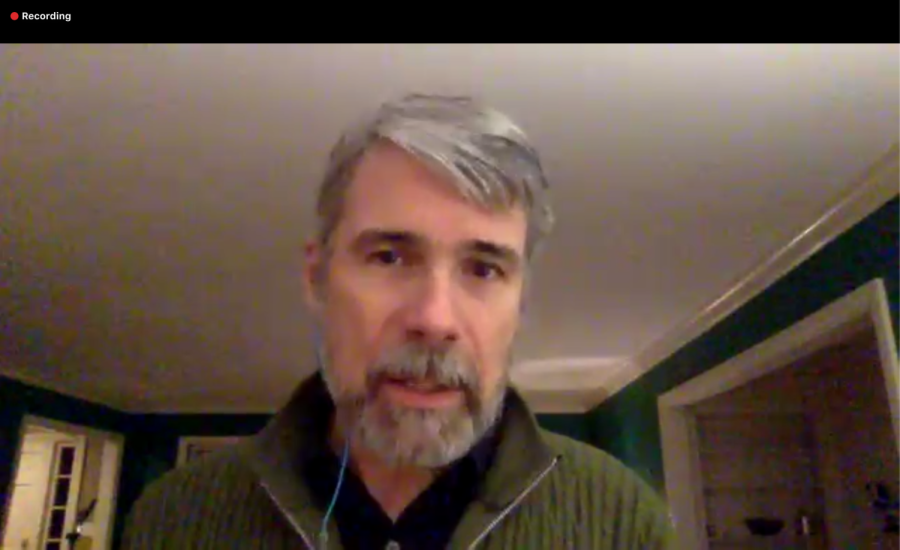Pitt CMRO chief talks COVID-19, vaccines at SGB meeting
Dr. John Williams, head of Pitt’s COVID-19 Medical Response Office, at Student Government Board’s weekly meeting on Zoom.
February 16, 2022
Dr. John Williams, the director of Pitt’s COVID-19 Medical Response Office, said at Tuesday’s Student Government Board meeting that while masks remain important for the immunocompromised, which includes at least 1,000 Pitt students, he thinks consistent mask use might go away in the “not distant future.”
“We are under the authority of Allegheny County and the county has been engaged very closely with higher education institutions throughout [the pandemic],” Williams said. “Unless the county and state say, ‘Hey, masks can go away,’ it’s not going to happen. I think it’s in our not distant future, honestly.”
Besides hearing from Williams about the state of the pandemic, the board voted on the updated elections code bill and on a charter for the LGBTQIA+ Task Force. The meeting also featured updates on Pitt dining experiences and Walnut Capital’s Oakland Crossings project.
Marcus Edelstein, the chair of the elections committee, asked Williams if he thinks there will be any additional COVID-19 vaccine doses. Edelstein said he is fully vaccinated, has his booster dose, follows safe practices and was very surprised when he still contracted COVID-19. Williams said it’s “very unlikely” there will be any more doses.
Williams added that COVID-19 is a “mucosal” virus — a virus that doesn’t enter the blood and only affects mucosal surfaces such as the respiratory tract — and humans do not make sterilizing immunity for these viruses, meaning it is not possible to become 100% immune. According to Williams, any amount of immunity to the virus will reduce transmission, and the “real goal” is preventing severe disease once the virus is contracted.
SGB President Harshitha Ramanan asked why the Centers for Disease Control and Prevention changed self-quarantine guidelines for those who test positive for COVID-19 from two weeks to five days. Williams said the CDC is constantly collecting data about the virus and uses it to inform all decisions made regarding those guidelines.
“We learned more — in the beginning, it was set a little bit long partly because people were being cautionary, but the data was pretty good, you could spread virus easily up to 10 days,” Williams said. “As we got more and more data about how the timeline of virus behaves in people, it became clear that five days is going to catch most people, so most people are not going to be shedding much virus at all after five days.”
The board unanimously passed Bill E.B.-2022-1 “Updating the Elections Code.” The bill was originally drafted to address concerns from students that arose from last year’s controversial election.
The bill included a change to the number of members on the elections committee from six to 10 members, establishes that members of the elections and judicial committees cannot be a board or presidential candidate the year they are serving on the committees, creates a new investigatory and disciplinary process for alleged Elections Code infractions and more.
The board also voted to finalize a charter for the LGBTQIA+ Task Force, led by Tyler Viljaste, the current chief of staff. Caroline Goodwin, a board member, said the mission of the task force is to advocate and provide resources for the advancement of LGBTQ+ individuals at Pitt.
They hope to hire new staff members and create a “physical center” for LGBTQ+ individuals on campus. Goodwin said they hope to meet with Vice Chancellor Clyde Wilson Pickett and Dean Carla Panzella to discuss specifics regarding staff positions.
Danielle Floyd, a board member and vice president of initiatives, said she is working alongside Pitt Eats and the Resident Student Association to create a dining survey to gather students’ experiences with on-campus dining locations. She also announced that the First-Year Council is hosting events next week for national eating disorder awareness week.
She said the First-Year Council also worked with Logan Kohnfelder, the new media director, to create flyers that talk about the SafeRider program, which offers complimentary transportation in the evening and early morning hours for Pitt and Chatham students, faculty and staff.
Daniel Temmallo, a board member, and Dominic Victoria, the chair of the community and governmental relations committee, attended a meeting on Monday with Walnut Capital representatives to continue discussing the Oakland Crossings project. Temmallo said the meeting was productive, and while remaining in opposition to the project, he looks forward to “continuing the dialogue.”
Allocations
The Muslim Student Association requested $2,010.41 to fund airfare and hotel costs for Amir Curic, a guest speaker that MSA is hosting as part of an on-campus program featuring speakers from around the world. The board approved the request in full.
Panther Lacrosse, a men’s competitive lacrosse team, requested $3,046.84 to fund travel costs to a competition in Tennessee. The board approved the request in full.
Chabad House on Campus, a Jewish organization that aims to increase Jewish involvement on campus, requested $2,500 to fund for an event featuring Rudy Rochman, a Jewish activist. The board approved the request in full.
Model UN requested $3,287.42 to fund registration and lodging to send 12 students to a conference in Virginia. They had $2,586.40 remaining in their yearly competition cap — amount of money they can request for competitions — so the board approved $2,586.40 to the competition cap.



